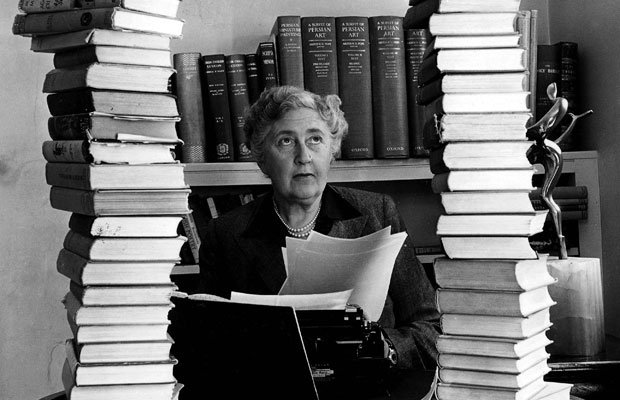Our Big Collection of Interesting Book Facts!
Posted by Jamie M., Book Specialist on Jun 13th 2018
To us, every single bit of a book is special. The written words inside are as cherished as the binding, and the history and unique story behind each and every book we carry is not lost on us!
That’s why we’ve started collecting Book Facts.
Call us bibliophiles, logophiles, or simply fact-hoarders, but who doesn’t love to learn something new every day?
Here, you’ll find our ever-growing, ever-interesting collection of Book Facts.
We hope you enjoy them as much as we do!
Did you know…?
-The first book ever to be written on a typewriter was The Adventures of Tom Sawyer by Mark Twain.
-In the Harry Potter books, the “T” at the end of Voldemort’s
name is silent. The movie franchise confused the pronunciation! Perhaps we
should stick with “He Who Must Not Be Named”...

-The world’s teeniest page turner, the smallest book in the
world is a printed copy of Teeny Ted from Turnip Town by Malcom Douglas Chaplin.
The reproduction is made of pure crystalline silicon, which costed $15,000 to
create, and the words are so small that the book can only be read by electron
microscope! Talk about some light reading…
-Bibliotherapy describes ‘the use of reading matter for therapeutic purposes’.

-The world record for most people balancing books on their heads at the same time and place goes to a group of 998 people in Sydney, Australia who set the record first in 2012.
-Books were not always displayed on shelves with the spine facing out. In fact, the first book with a printed spine dates way back to 1535. Before this, librarians would often chain books to shelves to prevent theft, and books would be shelved with the spines hidden.
-Reading for 15 minutes a day can really add up. You'd have read over 1,000,000 words in a year!

-Ever cuddled up under the covers with a good book? Congratulations, you're a librocubicularist: a person who reads in bed.
-Fun fact: It was almost a parrot that squawked, "Nevermore" in Edgar Allan Poe's famous poem. The iconic raven was only decided upon because Poe thought that the dark bird was "more in keeping with the intended tone" of the work.
-Reading via printed works versus e-readers has some major benefits including less strain on the eyes, higher retention rate of the material being read, and heightened memorization skills. Read more about the benefits of reading!

-When it comes to young readers, learning new words is a big step towards a greater love of literacy. In a year, children could learn between 4,000-12,000 new words from reading books!
-Jane Austen's Pride & Prejudice was originally titled First Impressions, but was changed due to the popularity of Sense & Sensibility - a marketing decision that brought this book great success.
-"Bookkeeper" is one of the only words in the English language containing three consecutive double letters.
-The Disney movie "Frozen" was based on Hans Christian Andersen's fairy tale, "The Snow Queen".
-Activist, author, and...cooking aficionado? Yes, in fact, the inspirational Maya Angelou published two cookbooks in her lifetime.

-Google reported in 2010 that 129,864,880 million books have been published. That's nearly 130 million books in existence to choose from - and the number is rising with each new publication!
-Reading has been shown to curb memory loss and improve cognitive thinking skills, leading to prevention of Alzheimer's Disease symptoms. Reading really IS good for you!
-According to research done at the University of Sussex, reading for as little as six minutes can help reduce stress rates by a whopping 68%!
-Reading, especially fiction books, has been shown to increase a person's ability to empathize. When reading from a character's perspective, we gain insight and understanding of the thoughts, feelings, and actions of others.

-A mentally stimulating activity, reading has been shown to curb memory loss and improve cognitive thinking skills, leading to prevention of Alzheimer's Disease symptoms.
-William Shakespeare's exact date of birth is often disputed, but many traditionalists celebrate it today - April 23rd. Oddly enough, it's the same date on which he died in 1616!
-If you finished a book every two weeks, you'd read 26 books in a year.
-Agatha Christie broke multiple Guinness World Records? The Queen of Crime was dubbed 'best-selling novelist', rewarded 'longest initial run' for her play 'The Mousetrap', and 'thickest book published' for 'The Complete Miss Marple'!

-'Hatchet' author Gary Paulsen placed 41st in the Iditarod Trail Sled Dog Race in 1983?
-The first documented use of the word 'nerd' was in a Dr. Seuss book? Appearing in "If I Ran the Zoo", published in 1950, #nerd describes an imaginary creature; in 1951, Newsweek magazine reported its use as a slang term, a synonym for 'square' or 'drip'.
-Reading can improve your attention span! Story structure encourages the brain to exercise thinking in sequence, bridging the gap between cause and effect - one of many reasons why reading to children is so important.
-Did you know...Aristophanes coined the longest ancient Greek word in his play Assemblywomen? The 172-letter word describes a fictional food dish containing everything from fish slices to rooster! Now if only we could pronounce it. Here it is: Lopado
Stay tuned as we continue to add more facts to this ever-growing list!
Got one you'd like to add? Let us know on Facebook!
